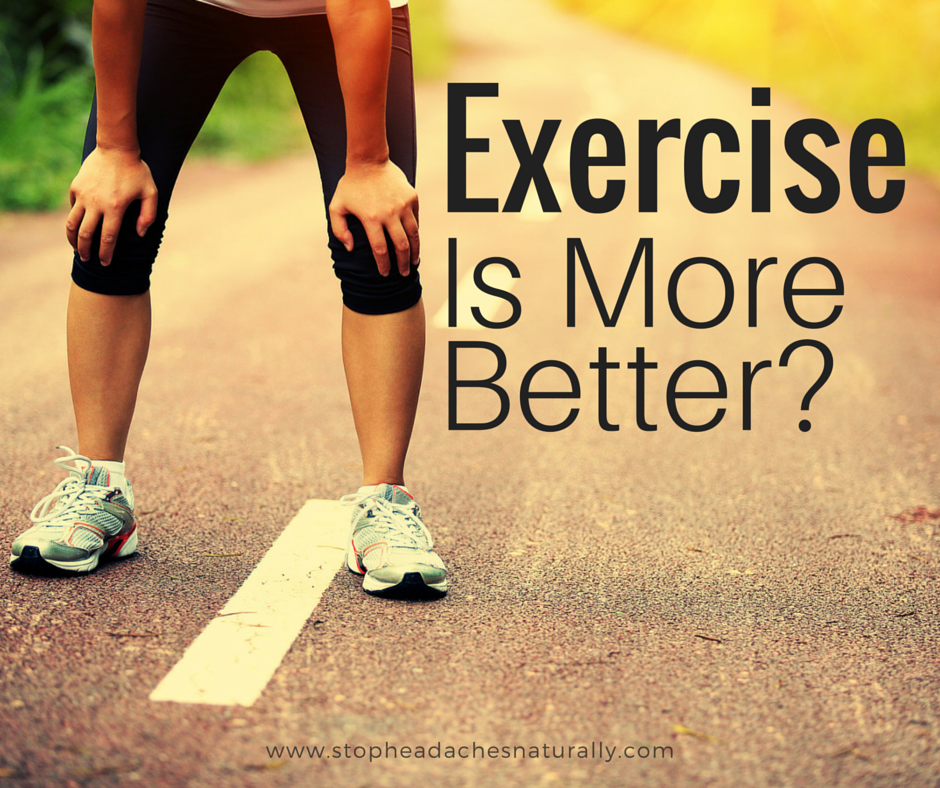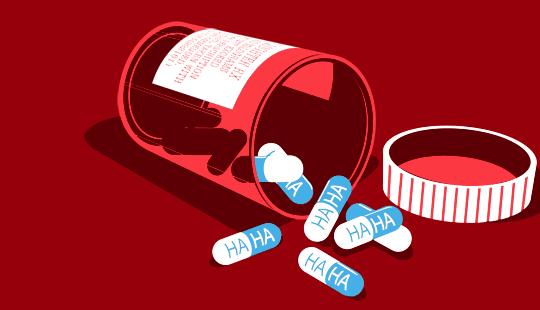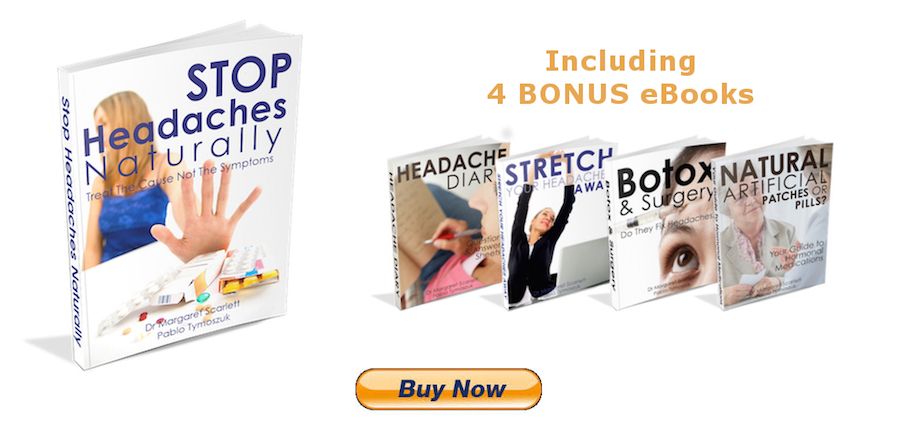Can A Happy Spouse Be Good For Your Health?

Happy hubby, happy wifey…
A recent study published in the Health Psychology Journal suggests that having a happy spouse is good for your health. Nearly 2,000 couples aged between 50 and 94 were asked about their happiness, health and exercise levels over the course of six years and these are some of the findings:
- Happy spouses are more likely to provide strong social support, such as caretaking
- Happy spouses encourage their partners to adapt healthy habits - regular exercise, eating well and adequate sleep
- Having a happy partner may enhance health and make life easier
So as the saying goes, “Happy wife, happy life” but now we can add, “Happy hubby, happy wifey.”
The Promise - The Lure Of The Quick Fix

Our pre-occupation as a society with the short term quick fix is one of the factors responsible for over-reliance on pain-killers.
When time is money and a “can do” attitude is paramount, we may feel we can’t afford to be ill or to be functioning below our best.
Instead of taking time out to look after our health, when something goes wrong we look to medication to fix the problem.
"We look to medication to fix the problem"
The following quote typifies the “pop a pill and forget it” attitude that is so prevalent:
"It's never a great start to the day when you wake up with a pounding headache. Fortunately, help is often as close as your medicine cabinet. You can pop a couple of aspirin, close your eyes, and, in all likelihood, that throbbing in your head will be soothed within the hour.
You’re in good company in your choice of remedy. Some 80 billion aspirin tablets are taken worldwide, every year, for all types of headaches including the excruciatingly painful form known as a migraine. That's a lot of pharmacological muscle."
If you think this was written by an advertising executive for a pharmaceutical company you would be incorrect.
Disturbingly, it was actually taken from a reputable internet site offering health advice to the general public.
However there is no doubt that pharmaceutical advertising helps foster the idea that medication can provide solutions to all of your health problems.
This is an excerpt from Stop Headaches Naturally Chapter 6.6 - The promise - the lure of the quick fix
Be Your Own Doctor

Even though there is so much information that can be found on the internet or health related Apps for your smart phone, one should NEVER self-diagnose or self medicate… leave that role for a well educated and qualified doctor.
But I do believe that the best medicine is prevention. For that to occur you need to take more of an active role in prescribing some of the most beneficial and effective medicine for yourself and become your own ‘doctor.’
"The best medicine is prevention"
Here is some ‘medicine’ that you can begin to take:
- Healthy & Varied Diet
- Exercise - cardio, strength & stretch
- Sleep
- Diaphragmatic breathing
- Laughter
- Keep hydrated
- Sunshine
- Positive attitude
- Pilates
- Manual Therapy
The Focus Of Western Medicine Is On Treatment Rather Than Prevention

“The doctor of the future will give no medicine, but will interest his patients in the care of the human body, in diet, and in the cause and prevention of disease.”
Thomas Edison
Although there have been many medical advances since Edison’s time, the doctor is unfortunately still “giving medicine”.
The traditional approach in Western medicine has always been to diagnose a particular disease or condition from known symptoms and then to treat it with medication, surgery or various procedures.
This focus on diagnosis and treatment worked well for infectious diseases, but is not very useful for multi-factorial chronic diseases like cancer and cardiovascular disease.
At the population level, the emphasis has shifted in favour of understanding the underlying causes of disease, and prevention through improvements to lifestyle.
However this has not really been translated to the individual patient-doctor consultation.
It is not just the doctor’s fault – patient expectations also contribute to this situation. Patients sometimes complain they have not got value for money if they don’t leave clutching a prescription, but just discuss factors like diet, exercise and sleep with their doctor.
Or if the doctor does recommend various lifestyle changes, patients frequently ignore this advice and keep looking for “the magic bullet”.
And when the patient is in pain, many doctors feel helpless if they can’t provide some form of pain relief.
This is an excerpt from Stop Headaches Naturally Chapter 6.8 - The focus of Western medicine is on treatment rather than prevention
Exercise - Is More Better?

A new study published in Current Biology found that people who exercise a lot don’t burn extra calories for their efforts beyond a certain point.
Now that doesn’t mean you stop exercising but it does shed some light on the misconception that more is better.
Read this interesting WebMD Heath News article and find out:
- What did the study find?
- The role of exercise in weight loss
- Why is it that more exercise is not better?
- Do we hit a kind of plateau?
- How do you find your ’sweet spot’?
- What’s the best take-home advice from this research?
What Is Prentative Medicine?

Have you ever tried fixing a leaky roof when it’s raining? The only thing you can do is place a bucket under the leak and temporarily repair the leak.
Once the rain stops, it’s easy to remove the water from the bucket and hope it doesn’t rain again. But if this cycle continues, the leak that was once only a single drop in a bucket, can worsen to the point were the roof can buckle and cave in.
Many of us can apply this behaviour to our health. It’s important that once we experience a ‘leak’ in our health - whether its back pain, tension headache or migraine - make the time to fix it.
"Once we experience a ‘leak’ in our health - whether its back pain, tension headache or migraine - make the time to fix it"
So don’t wait until it rains again. If the sun is shining and there are blue skies, make sure you make the time to take preventative measures to ensure that your roof contains no cracks or faulty plumbing.
Stay posted! I will be providing some Preventative Medicine strategies in upcoming posts…
Don’t Let Your Thirst Dictate Your Water Intake

Dehydration may seem a mild problem but even at a moderate level it can cause a lot of distress to an otherwise healthy person - if the problem is severe, it can even become life threatening. Our body is about 70% water and any decrease in this level can lead to many uncomfortable ailments including headache and migraines. So if you suffer from such complaints, it is important to keep your body well hydrated.
What is dehydration?
Dehydration is basically a deficiency of water in our body. In order for our body to function optimally, the balance between electrolytes and water needs to remain normal. When this balance is disrupted, we suffer from a number of physical symptoms that are collectively known as dehydration.
Common symptoms of dehydration
Following are a few of the most striking symptoms of dehydration:
• Headache
• Excessive thirst
• Dryness of mouth
• Dry, wrinkled skin with decreased elasticity
• Fatigue and weakness
• Muscle pain
Relation between dehydration and headache
The reason behind this is not clear but some studies have shown that it is due to the constricted blood vessels in the head that are trying to regulate the fluid levels and conserve water. This creates a deficiency of blood supply and therefore oxygen to the brain, creating a headache.
Dehydration can cause headaches and even trigger a migraine attack. The amount of pain may vary from person to person. It can be felt either in the front or back of the head or only on one side. There are some people who feel it throughout the entire head, mimicking a tension headache. A common symptom of a dehydration headache is increased pain with any head movement or walking.
Treating a dehydration headache
In order to treat a dehydration headache, you simply have to drink some water to rehydrate your body. It is best not to drink too fast. Instead, slowly drink 2-4 glasses of water and your headache will subside within a couple of hours. In some cases when you are unable to consume food or if a child is dehydrated, drink fluids that contain electrolytes such as a sports drink.
It is also important to rehydrate without sweating otherwise you will continue to lose fluids. So move to a cool environment or find some shade.
If the problem persists, it is best to consult a doctor who will prescribe I.V. fluids for faster recovery from dehydration.
Preventative measures
Drinking enough water throughout the day is the best way to prevent dehydration headaches. Although 6 - 8 glasses of water (1.5 - 2 litres) is considered ideal, this will vary according to your weight, physical activity and whether you live in a warmer climate or higher altitude.
Many people fall in the trap of never drinking enough water because they never feel thirsty - don’t let your thirst dictate your water intake. It is recommended to drink enough water so your urine is clear and a pale yellow colour.
Refrain from alcohol and excessive caffeine, because they act as a diuretic – leading to dehydration. Fruits and vegetables are great for health and energy but they are not a substitute for drinking water.
Image: spongysponge
________________________
Pablo Tymoszuk is a soft tissue therapist specialising in remedial, myofascial and dry needling techniques. He also acts as an ergonomic specialist and wellness consultant which has motivated him to co-author the eBook Stop Headaches Naturally.
Together with Dr Margaret Scarlett they present a range of strategies for stopping headaches and migraines without drugs. All strategies are organized in a systematic manner and backed up by references to the scientific literature.
Laughter Better Than Medicine And Affects The Body Like Exercise

After a real belly laugh and wiping the tears from my eyes, there is no doubt to me that my mind and body are better for it... even though my ribs hurt, it's as if a weight has been lifted off my shoulders.
I have always believed that laughter is as good as medicine. So when I came across this article by dailyhealthpost.com regarding 'mirthful laughter' [*] and it's health benefits, I was interested. I trust that you find it as interesting as I did.
[*] Mirthful: full of or showing high-spirited merriment
Enjoy the read...
We are rife with involuntary reactions. We know why we sneeze. We know why we cough. We know why we blink our eyes. But we don't really know why we laugh.
Sense of humour is personal but everyone has one. We weren't built with extraneous physiological processes, everything our bodies do has a purpose. So while we may not know why we laugh, we now know that doing so contributes to physical and emotional health.
In the 1970s, Norman Cousins, editor of the Saturday Review, published his story of laughter as medicine in The New England Journal of Medicine. He subsequently published books on the subject of mind-body healing: Anatomy of an Illness, Head First, and Mind Over Illness. In these, he explores his experience of having been diagnosed with life-threatening heart disease in 1964 for which he had self-treated with massive doses of vitamin C and laughter. [1] (Cousins died in 1990). His story spurred scientific research into the psychology of laughter - gelotology. Many studies have now shown that laughter does, in fact , promote wellness.
The results are complex and fascinating.
Laughter appears to occur more frequently and has a greater physical impact when it occurs in a group setting. laughing alone is good but laughing with others is even better. The physical act of laughing causes the release of endorphins-neurotransmitters that moderate pain and stress with an opiate effect.
In a controlled study, pain threshold was significantly higher after laughter than without. [2] Even anticipation of the prospect of "mirthful laughter" reduces stress hormone levels and increases endorphins and human growth hormone (which contributes to optimizing immunity).
A study of high-risk diabetics found that:
“the addition of an adjunct therapeutic mirthful laughter Rx (a potential modulator of positive mood state) to standard diabetes care may lower stress and inflammatory response and increase 'good' cholesterol levels. The authors conclude that mirthful laughter may thus lower the risk of cardiovascular disease associated with diabetes mellitus and metabolic syndrome.” [3]
The benefits of laughter don't stop there.
The physical act of laughter - not just a chuckle, but real, belly-type laughter - is exercise. If you've ever had one of those episodes (and we certainly hope that you have) in which you laugh so hard that you cry and can't breathe, you know that you could be a little sore afterward. Without thinking, the act of laughing promotes various physical activities:
1. Laughter dilates blood vessels, improving circulation, and exercises abdominal, facial and other muscle groups.
2. The release of growth hormones and dopamine in the brain bring a sense of euphoria and happiness - a high that improves not only mood but supports immune function.
3. With the release of hormones and neurotransmitters during and following a bout of laughter, blood sugar and cholesterol levels are reduced. These effects can last for days, especially if laughter is a regular part of your life.
4. With the highs comes the lows - in a good way: improved blood flow and body nourishment, the reduction of stress and pain, and emotional contentment are followed by greater relaxation and better sleep quality.
Science was loth to investigate the phenomenon of laughter until fairly recently. Unlike other involuntary response, it seemed... click here to read the rest of this article.
Source [1] [2] [3]
Pablo Tymoszuk is a soft tissue therapist specialising in remedial, myofascial and dry needling techniques. He also acts as an ergonomic specialist and wellness consultant which has motivated him to co-author the eBook Stop Headaches Naturally.
Together with Dr Margaret Scarlett they present a range of strategies for stopping headaches and migraines without drugs. All strategies are organized in a systematic manner and backed up by references to the scientific literature.
Can You Exercise For Just 60 Seconds A Week & Transform Your Health?

There are many people who don't exercise because they believe they need to run or cycle hundreds of kilometres, bench press the weight of a car or have a personal trainer that pushes them to new levels to achieve their fitness goals... but that is not true!
Let me make myself clear, I support the personal training industry but not everyone responds to that sort of training.
I have always questioned excessive exercise due to the negative effects it has on the body. Yes, if you want to be on the front cover of Men's Health Magazine with 10% body fat or compete in next years Tour De France, your body will have to undergo serious training to achieve such feats.
On the other hand if your goal is to control your weight, increase your health and decrease the chances of illness or disease, then do you really need to train 4-6 days of week? All you need is a simple fitness program that develops your strength, flexibility and endurance.
High Intensity Training (HIT) has been used for many years. It is a great way to achieve your fitness goals without excessive exercise, reduce the incidence of overuse injuries and allow you to live a balanced life without the stress of meeting unrealistic fitness goals.
Here is an excerpt from Dr. Michael Mosley's (author of 2:5 Diet) Daily Mail article that explains the importance of exercise and the benefits of High Intensity Training...
"Everyone agrees that getting more active will add years to your life (around 2.2 years, to be exact).
But, more importantly, it will significantly reduce your risk of developing a range of chronic diseases, from cancer to heart failure, dementia to diabetes.
Exercise will also help you sleep better, improve your mood and even perk up your sex life, according to the well-regarded Mayo clinic in the U.S. (even help reduce tension headaches).
But how much should you do? In 2008, a committee of U.S. scientists recommended 150 minutes of moderate exercise a week, while cautioning the necessary amounts 'cannot yet be identified with a high degree of precision'. 'In trials, most people say they prefer HIT to conventional exercise, not least because it is over so quickly'
This 150 minutes a week remains the recommended level despite the fact that less than 20 per cent of us do anything like that. The most common excuse is a lack of time. That has certainly been mine - which is why the idea of HIT appeals to me."
Keep reading this interesting article by Dr. Michael Mosley and you will also find out about:
- Roger Bannister Was A 'Fast' Exerciser
- You'll Want To Eat Fewer Calories
- Even Two 20-Seconds Bursts Help
- Your Muscles Will Be More Powerful
- Could It Be Dangerous
Photo: Bahrain Personal Training
Pablo Tymoszuk is a soft tissue therapist specialising in remedial, myofascial and dry needling techniques. He also acts as an ergonomic specialist and wellness consultant which has motivated him to co-author the eBook Stop Headaches Naturally.
Together with Dr Margaret Scarlett they present a range of strategies for stopping headaches and migraines without drugs. All strategies are organized in a syst





